Brian Haw memorial: Sir Mark Rylance leads campaign
- Published
Sir Mark Rylance told the BBC why Brian Haw should have a statue
In 2001 peace campaigner Brian Haw pitched up his tent on a patch of grass opposite the Palace of Westminster to protest against UK and US foreign policy.
For nearly a decade London's Parliament Square would remain his home, a place where surrounded by numerous huge anti-war placards he would bellow through his megaphone at politicians heading into work. He became closely associated with dissent against the wars in both Afghanistan and Iraq.
To maintain his efforts for those 10 years, he would be helped by passers-by and fellow campaigners, among them Oscar-winning actor Sir Mark Rylance.
"I had a lot of jobs in the West End and I live in south London so my route home after the show... often was through Parliament Square, and so when I was on my bicycle, I would always stop and have a word with him, and give him 20 quid or whatever I had in my pocket," he explains.
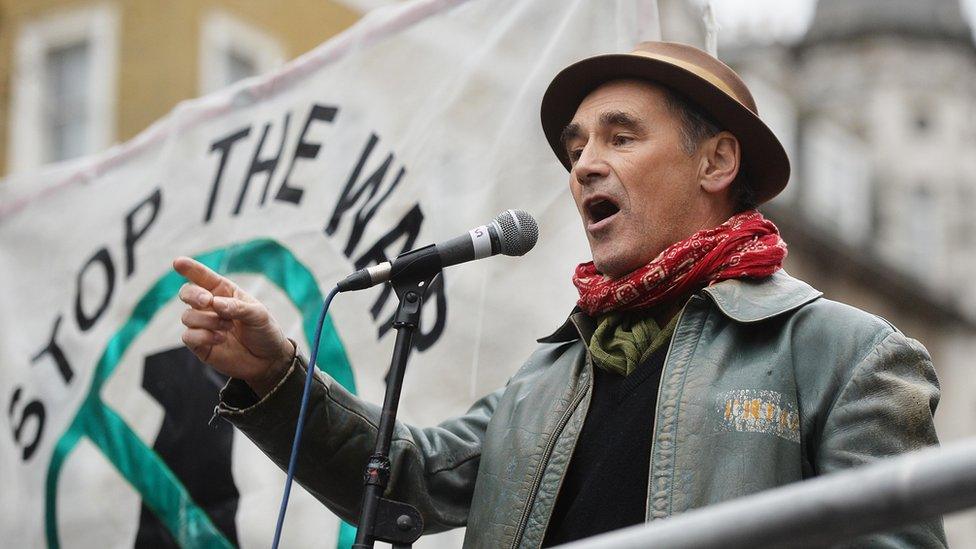
Sir Mark Rylance has spoken at various anti-war rallies
A patron of the Stop the War coalition and charity Peace Direct, Rylance is a well-known anti-war campaigner. He says he remains in awe of a person he considers to be "one of the greatest Englishmen that I've met in my life in terms of being a person who listened to his conscience".
"I'm able to think and feel things about that issue, and go on marches, and stand up and give speeches or do things like this, but not 24 hours a day, not every day of the year - it would drive me mad I'm afraid, I just couldn't do it.
"And yet he was able to do it and retain his sanity and kindness."
Over the years Mr Haw repeatedly found himself the attention of politicians, police, Westminster City Council and the then-mayor of London. Efforts were made to remove him from his pitch, take him to court and even confiscate his megaphone.
He proved such a pain for those in Westminster that legislation was passed in 2005 specifically to try to make him leave, with all unauthorised protests within a square mile of Parliament being banned.
Yet still he could not be budged as it was deemed that since his campaign began before the Act came into effect, the exclusion zone did not apply in his case.
Away from politics and police, he would suffer physical attacks by random people as he slept in his tent in the square, while ill health also took its toll, leaving him on crutches for the last year of his life.
It would be his health which would finally take him from the square and in June 2011 Mr Haw died, aged 62, in Berlin where he had been receiving treatment for lung cancer.
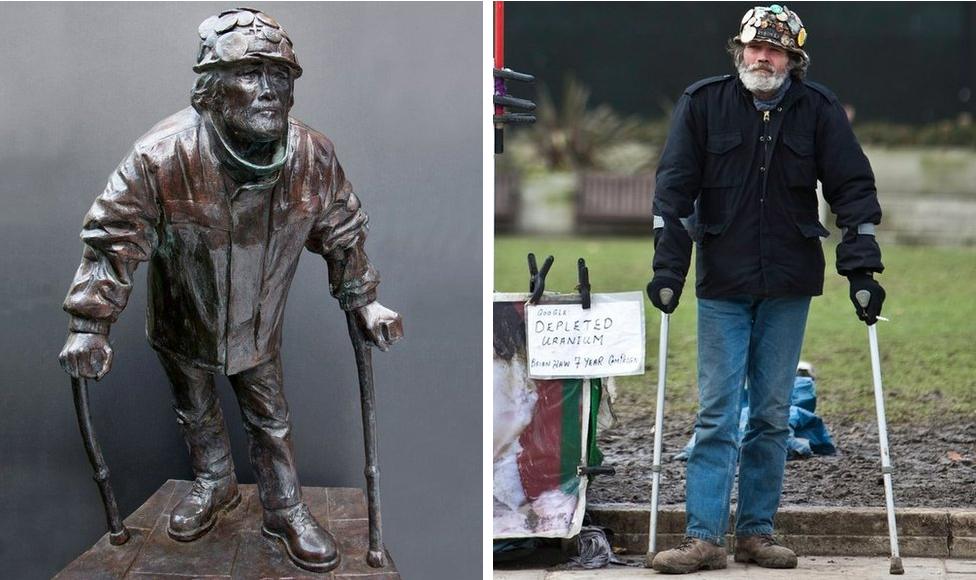
Amanda Ward's 72cm tall statue is based on Mr Haw's appearance in the year before he died
Rylance is part of a crowdfunding campaign to erect a small bronze maquette, which has already been created by artist Amanda Ward, on a plinth opposite the big guns of the Imperial War Museum in Lambeth.
"It's just a small group of people who admire Brian and have made a statue of him and feel that he's a remarkable person in the history of London," the actor and director says.
The group hopes to raise £50,000 through the public appeal and is asking people to donate £1 each. It says money is still needed for things like erecting railings before the artwork can be placed outside the School of Historical Dress.
It's a building that seems an apt place for a tribute to a man who spent much of his life highlighting the consequences of war, given it was part of Bethlem psychiatric hospital in 1918 and was regularly a place where World War One soldiers who were suffering from shellshock were treated.
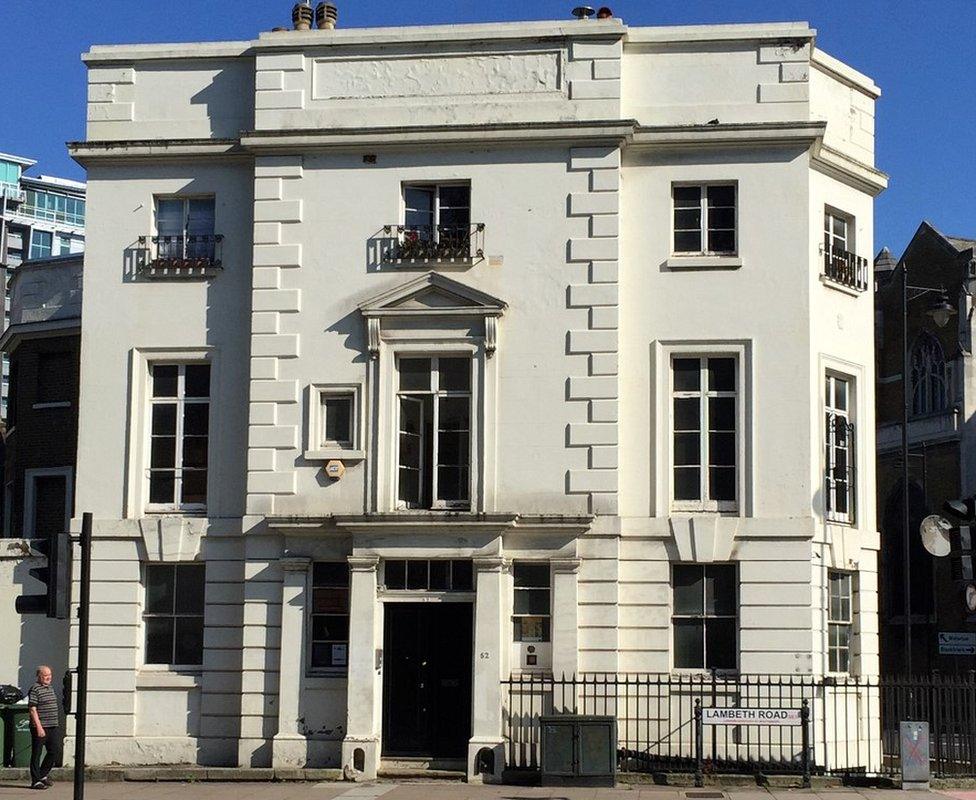
The School of Historical Dress stands just outside the exclusion zone set up in 2005 - which failed to remove Mr Haw from Westminster
Rylance hopes the monument will also act as a reminder of the importance of public campaigning.
"It's a wonderful aspect and privilege of our lives here in London, that protests are possible," he says.
"I think it's a very important part of society, and one that the authorities are obviously trying more and more now to constrain and that, I think, would be a great loss.
"So that's another good reason that we get him there where he should be, you know, protesting, standing peacefully across from the Imperial War Museum."
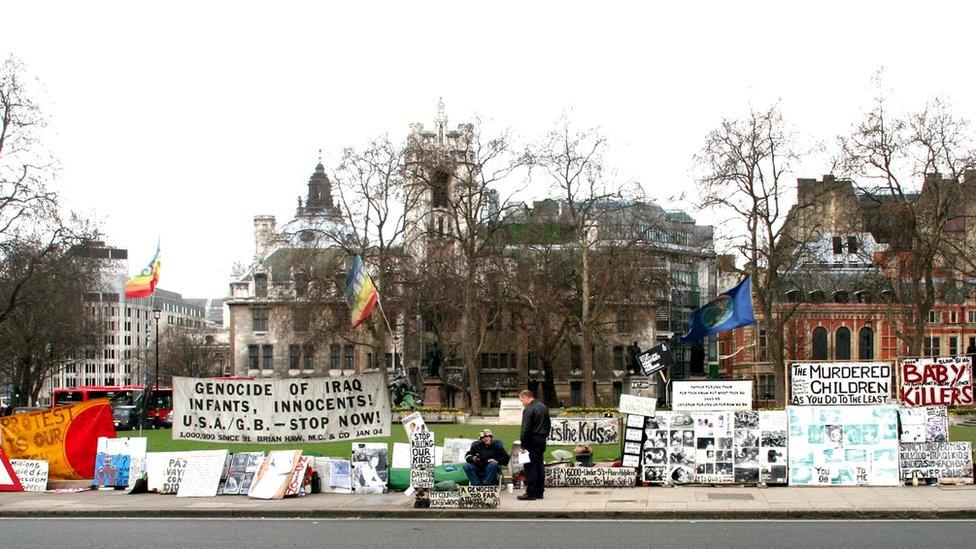
Mr Haw died only months after he left his protest camp in 2011
Asked whether a man some considered to be a nuisance and who was accused of making a mess of a famous historical space should be remembered, Rylance replies that "the mess of Brian's protest was nothing" when compared to when "our leaders take us into wars where we are mercilessly killing children - I think that's the mess".
"I think if something offends you, look at the causes of it," he adds. "That's what Brian was saying. So if you're offended by what Brian did, if you're offended by what Extinction Rebellion are doing now, look at the cause.
"It's not an easy thing to do to be a protester, it takes a lot."
As such Rylance believes it would be only fitting to have a monument put in place for a man who became an unswaying fixture in the capital for the last 10 years of his life.
"He was a constant voice at Westminster for longer than most prime ministers," the actor says.
"Brian was a general... he was a soldier for peace, and so I think it'd be a terrible shame if there wasn't a statue to him somewhere in London."

The protester who lived in Parliament Square
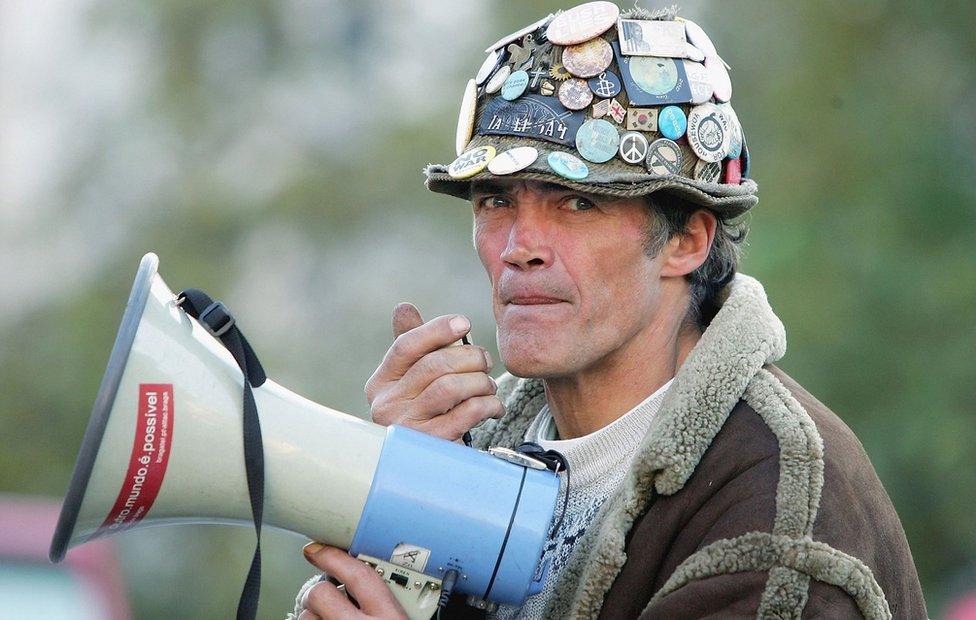
Born in 1949, Brian Haw was raised as an evangelical Christian
He was living in Redditch, Worcestershire, with his wife and seven children when he began his Parliament Square protest
His father was one of the first British soldiers to enter Bergen-Belsen concentration camp in World War Two and subsequently took his own life when Mr Haw was aged 13
He set up camp in Parliament Square Gardens on 2 June 2001 in response to sanctions against Iraq. His protest grew broader after the invasions of Afghanistan and Iraq
Westminster City Council began legal action to remove him a year later but only succeeded in limiting the hours during which he could use his megaphone
In 2006 the Court of Appeal ruled that Mr Haw needed police permission to continue his campaign, which was granted - but with his protest site limited to an area 3m wide by 1m deep by 3m high
In March 2011, a High Court ruling obtained by then-mayor of London, Boris Johnson, forced him to move his camp on to the pavement
Mr Haw died aged 62 in Germany where he had been receiving treatment for lung cancer

Follow BBC London on Facebook, external, Twitter , externaland Instagram, external. Send your story ideas to hellobbclondon@bbc.co.uk, external
Related topics
- Published30 June 2013
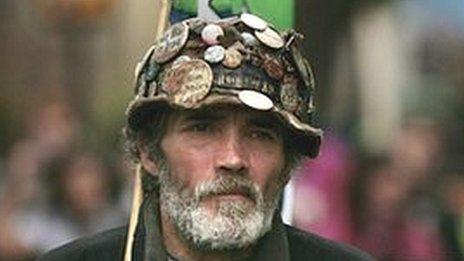
- Published20 June 2011
- Published20 June 2011
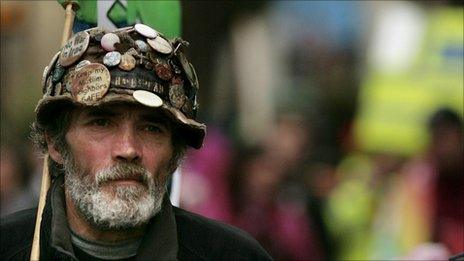
- Published19 June 2011
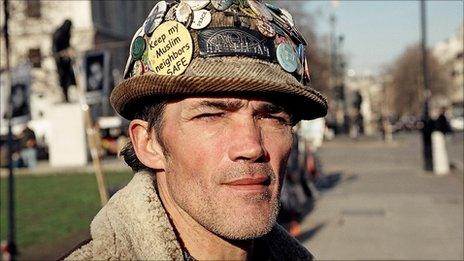
- Published8 July 2011
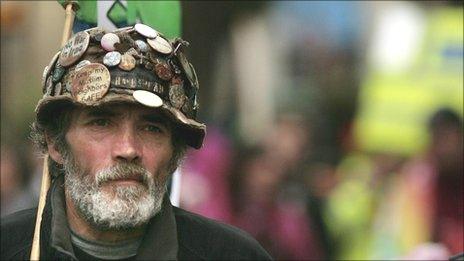
- Published15 April 2011
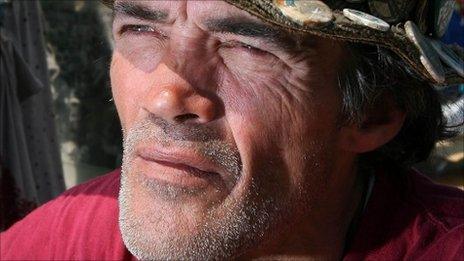
- Published17 March 2011